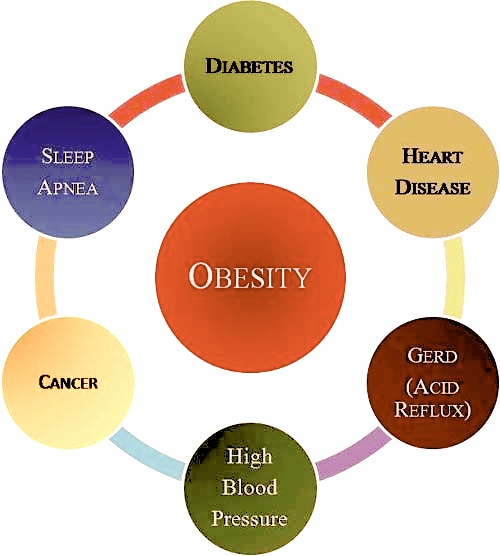There is increasing evidence that obesity does play some role in the causality of breast cancer. There are over 40,000 women who die of breast cancer each year in the US.
An old study investigated the link between body weight and the recurrence of breast cancer. This study showed that 55.6% of overweight women had a 5-year survival rate compared with 79.9% of normal weight women. Additionally, it was shown the more obese women had larger tumor sizes as well as higher rates of lymphatic and nodal involvement. Since this older study, there have been more than 50 studies looking at the relationship between body weight and prognosis. A recent meta-analysis of 45 of these studies showed that women who are obese at the time of diagnosis of breast cancer of breast cancer and overall related mortality than normal weight women. More recently, the ADEBAR study revealed that obese women had a significantly higher breast cancer recurrence rate than women who had a BMI less than 25.
Another study shows that nutritional factors play a major role in the development of obesity. It showed that there is a link between obesity such as high fat/low fiber intake, obesity, and timing of weight gain. The mechanism that is suggested for the link is insulin resistance and the concomitant estrogen excess. Additionally, it states that hyper-insulinemia can also influence the growth of the tumor.
Molecular links between obesity and breast cancer were investigated in another study. This article explores several hypotheses of the link. In obese post-menopausal women, it has been theorized that increased circulating levels of estrogen due to aromatization of androgens in adipose tissue is a major causative factor. It also mentions the role of insulin resistance and insulin-like growth factors (ILF) and how they work as mitogens. However, they put out a newer hypothesis stating that obesity should be considered equal to an endocrine tumor. Adipocytes used to be considered energy-storing cells. However, there is now a large body of research showing that they are dynamic endocrine cells and secrete a large variety of cytokines, polypeptides, and hormone-like molecules. Adipocytes make up the largest part of the human breast, with just 10% being epithelial cells. Often, when the breast cancer spreads and breaks through basement membranes, it allows for paracrine interactions to occur with the 2 tissue types. There are some studies that show that adipose tissue secretes adipokines and can directly influence the growth of tumors. Studies in mice revealed that adipokines could up-regulate genes that are involved in the invasion, infiltration and metastasis of breast cancer cells under proper conditions. Additionally, they simultaneously down-regulated p18 and BARD1, which are a cell cycle checkpoint inhibitor and a tumor suppressor. This study was the first to show direct evidence for adipocytes promoting aggressive growth in tumors. The article goes on to talk about the role of the other inflammatory cytokines which, unfortunately, is outside the scope of this discussion but will be covered in future obesity hub posts.
Again, obesity is a complex disease and more evidence is being found between it and the onset of certain disease. Inflammatory cytokines are showing to play a huge role and there is much research on-going in this regards.
 Copyright secured by Digiprove © 2016 Linda Girgis, MD, FAAFP
Copyright secured by Digiprove © 2016 Linda Girgis, MD, FAAFP


